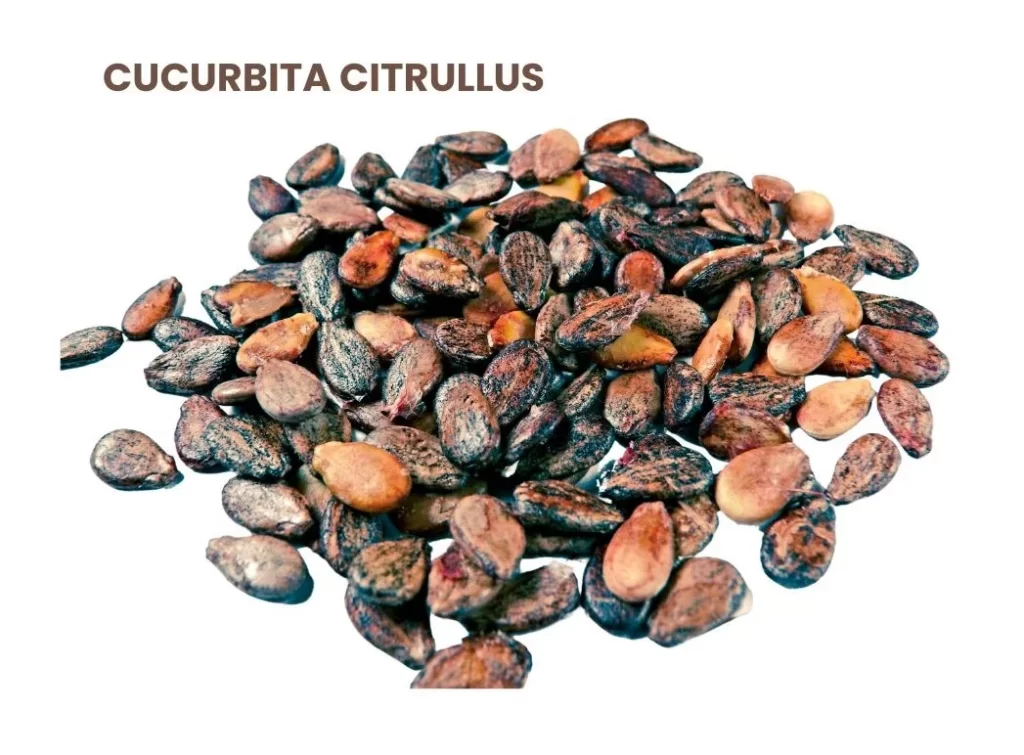Cucurbita Citrullus, commonly known as Watermelon, is a fruit-bearing plant species belonging to the Cucurbitaceae family.
The seeds of watermelon are used in homoeopathy for their therapeutic properties, particularly in addressing conditions related to painful urination and backache.

Table of Contents
ToggleSOURCE INFORMATION
Scientific Classification
- Kingdom: Plantae
- Order: Cucurbitales
- Family: Cucurbitaceae
- Genus: Cucurbita
- Species: Cucurbita Citrullus
Origin
- Watermelon is believed to have originated in Africa, particularly in the Kalahari Desert region.
- It has been cultivated for thousands of years, with evidence of its consumption dating back to ancient Egypt.
- Watermelon spread to other parts of the world through trade and exploration, becoming a popular fruit in various cultures.
Historical Facts
- Watermelon has a rich cultural history, with mentions of its consumption found in ancient Egyptian hieroglyphics and Greek literature.
- It was prized by ancient civilizations for its refreshing taste and hydrating properties, particularly in hot climates.
- Over time, watermelon became popular worldwide, with different varieties developed to suit various climates and growing conditions.
Medicinal properties
- In traditional medicine, watermelon seeds have been used for their diuretic properties, helping to alleviate conditions such as painful urination and urinary tract infections.
DRUG PATHOGENESIS
- Watermelon seeds are known for their diuretic properties, promoting urination, and helping to relieve symptoms of painful urination and backache.
- They may act as a mild tonic for the urinary system, supporting its function and promoting the elimination of toxins through urine.
KEY CHARACTERISTICS
- Painful urination with a sense of constriction: Watermelon seeds are indicated for conditions characterised by painful urination, often accompanied by a feeling of tightness or constriction in the urinary tract.
- Backache: They may also help alleviate backache, particularly when associated with urinary discomfort or dysfunction.
MODALITIES
- Symptoms may be aggravated by dehydration or lack of fluid intake.
- Improvement may be observed with increased urination and hydration.
WHAT ARE MODALITIES IN HOMOEOPATHY?
RELATIONSHIP WITH OTHER DRUGS
- Watermelon seeds may complement the action of other diuretic herbs or remedies used to address urinary conditions.
- They can be used in conjunction with other homoeopathic remedies indicated for painful urination or backache.
DOSE
- Watermelon seeds are typically prepared as an infusion or tincture.
- The dosage and potency should be determined by a qualified homoeopathic practitioner based on individual symptoms and characteristics.
Frequently Asked Questions
Are watermelon seeds safe to consume?
- Yes, watermelon seeds are generally safe for consumption when consumed in moderation as part of a balanced diet.
- However, in homoeopathy, highly diluted preparations of watermelon seeds are used for their therapeutic properties.
Can watermelon seeds be used for weight loss?
- Some people believe that watermelon seeds may aid in weight loss due to their diuretic properties.
- However, more research is needed to support this claim.
Meaning of Difficult Words
- Diuretic: A substance that promotes the production of urine and increases urination.
- Tonic: A substance that invigorates or strengthens the body or a particular organ system.
- Hieroglyphics: A system of writing using symbols or pictorial characters, particularly associated with ancient Egyptian writing.
- Constriction: A feeling of tightness or narrowing.
- Infusion: A method of preparing herbal remedies by steeping plant material in hot water to extract its active constituents.
